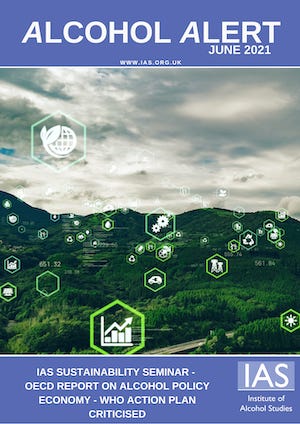Alcohol Alert 2021 : The Year in Review
As we near the end of another COVID-filled year, we reflect on the progression, stagnation and regression in the world of alcohol research, policy and harm.
Sadly the most prominent story and area for concern was the news that alcohol-specific deaths across the UK rose by a shocking 19% in the previous year, likely due to a change in drinking habits during the COVID lockdowns. With experts highlighting that many of these habits continued throughout 2021 despite a relaxation of lockdown restrictions, 2022 constitutes an important time to improve alcohol policies.
The announcement in the October Budget that alcohol duty would be reformed marked an exciting development, with a plan to tax all products based on their strength from February 2023. Although clearly a step in the right direction in terms of improving public health, there are still many questions about whether the reform goes far enough, particularly with cider receiving a preferential rate compared to beer and a reduction in duty received. There are bigger public health concerns regarding the continued freeze to duty rates.
With an increasingly virtual world, IAS has been able to host a number of online seminars, attended by an international audience of public health experts, government officials and politicians, and NGOs. All of our events have been recorded and can be found on our YouTube channel. These include our ‘Alcohol & Sustainability series’, and the launch of two IAS-funded reports: ‘Alcohol marketing during the 2020 Six Nations’ and ‘Preventing underage alcohol purchasing online using payment card details’. We look forward to hosting more in 2022.
Please read on for a roundup of the rest of 2021.
January – Pandemic makes this year’s Dry January the toughest yet
The year began as ever with many foregoing alcohol, however there were various reports that suggested people were struggling more than previously to abstain throughout the month. Meanwhile the Government banned takeaway alcohol in a bid to control the spread of COVID, and a PACTS report recommended various drink drive countermeasures.
February – A roadmap out of lockdown
The Government announced a roadmap out of the third national lockdown, with industry bodies criticising the potential ‘no alcohol’ rule when hospitality reopens. A number of studies highlighted the change in drinking habits in 2020, and a paper by Dr Elena Dimova showed fatherhood is a good time to intervene on men’s alcohol consumption.
March – Budget 2021: Duties for alcohol kept on ice
The Chancellor announced a freeze on alcohol duties once again, costing the Exchequer £1.7bn from 2020-2026 – a cumulative loss of £14.3bn when including previous duty freezes. A study by IAS’ Lucy Bryant and Liverpool University’s Dr Carly Lightowlers showed the lowest socioeconomic groups experience disproportionate rates of alcohol-related violence.
May – 20% more deaths directly caused by alcohol in 2020
England and Wales saw the highest number of alcohol-specific deaths since the ONS began comparing data in 2001, while a new report showed that alcohol marketing is appealing to children and likely to increase susceptibility to drink.
June – OECD shows how cost-effective alcohol policies are
A comprehensive report by the OECD showed that with the most effective alcohol control policies, for every 1 dollar spent a country gets 16 dollars in return. At the same time the WHO released its draft action plan, which was widely reported for a poorly phrased section about preventing drinking among women of “childbearing age”.
July – 741,300 cancer cases a year worldwide attributable to alcohol
Researchers at IARC highlighted alcohol’s huge burden on cancer cases across the globe, with men accounting for 77% of those cases. A team at LSE suggested early football matches increase domestic violence, highlighting additional considerations of violence when scheduling sporting fixtures.
August – Record drug deaths in England and Wales
2020 saw the highest drug deaths in England and Wales with 11,000 deaths, following years of cuts to treatment services. Meanwhile the LGA called for public health issues to be a “legal requirement” when councils grant alcohol licences.
September – Alcohol ads every 12s in England vs. Scotland 2020 Six Nations match
A study showed that the Six Nations matches are covered in alcohol ads, with barely any having ‘responsible’ drinking message (0.4% in Eng vs Scot match), despite the industry claiming such messaging is needed “more than ever”. Sadly, new DfT figures showed a big rise in serious injuries from drink driving.
October – Big change for alcohol duty
The Chancellor announced a reform of alcohol duty from February 2023, in which all products will be taxed based on strength – we will wait and see whether this will help improve public health. A study by LSHTM found misinformation of cardiovascular risk spread across alcohol industry-funded websites.
November – Marketing report highlights danger to children and vulnerable people
An AHA report showed why the UK’s self-regulatory approach to alcohol marketing fails to protect those most at risk in society, and recommends alcohol be included in the junk food ad ban. Elsewhere the Ministry of Justice rolls out ‘ankle sobriety tags’ for those known to reoffend after drinking alcohol.
Thank for subscribing to the Alcohol Alert, and we look forward to providing you with more alcohol policy newsletter roundups in 2022!














